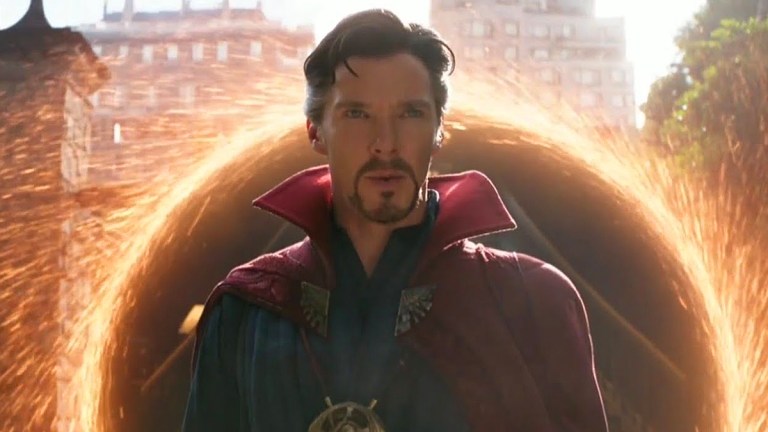Is Marvel Phase 4 Turning Doctor Strange into Reed Richards?
Like the Fantastic Four's Reed Richards before him, Stephen will have to grapple with the downside of controlling the future in Doctor Strange in the Multiverse of Madness.

It’s commonly accepted that the greatest villain in Fantastic Four history is Doctor Doom, but what’s typically less understood is that the second greatest villain in the F4 pantheon is Reed Richards himself. Or at least parallel versions of him. And what’s absolutely fascinating about the world we live in now is that Marvel seems to be doing their damnedest to turn the movie version of Doctor Strange into the comics version of Reed Richards.
To understand how Doctor Strange in the Multiverse of Madness might take a good chunk of its inspiration from the journey of Reed Richards in Marvel Comics, let’s first take stock of how Doctor Strange has been depicted in the MCU.
What If…? and the Multiverse of Strange
The Stephen Strange of the MCU is a distant one. In fact, his whole story thus far, whether in the main MCU or in one of its parallel dimensions in What If…?, has been about the terrible burdens (and ego) he has to bear as the Sorcerer Supreme.
We’ve seen him daring to lecture two gods in Thor: Ragnarok; in a near-constant pissing contest with the MCU’s previous prime egomaniac, Iron Man, in Avengers: Infinity War and Endgame; and cold-hearted to the plight of Peter Parker in Spider-Man: No Way Home. In the main MCU, his story, going all the way back to when he was a hot shot surgeon, is about how he keeps himself from forming substantial human connection because he’s consumed by his work and the arrogance of being the best.
That changed a bit in last year’s animated Marvel series, What If…?. That Stephen was every bit the arrogant madman of the main MCU, but with just a sliver of connection let in. The death of Christine Palmer led him down a dark path where he tried to undo her passing – a fixed point in his universe’s timeline. He sought the darkest powers available to him and eventually succeeded in resurrecting her just long enough for her to see what a monster he had become before she melted away like the rest of her universe.
The Case Against Reed Richards
Meanwhile, the Reed Richards of Earth 616 is unquestionably heroic, but he has definitely had his ethical lapses! He’s prone to making accidental doomsday weapons; he sometimes gets too wrapped up in doing science to be a good parent or husband or friend; he hasn’t cured his best friend of his rock monsteritis despite being the smartest person to ever live. But his heart is there. He is, with Captain America, the hero the rest of the Marvel Universe looks up to, a man who fights to save the world and adores his family. In fact, it’s the “adores his family” bit that makes him something of an outlier in the multiverse.
Much like MCU Doctor Strange, Reed has ultimately found the multiverse to be acutely dangerous. In the opening arc of Jonathan Hickman and Dale Eaglesham’s seminal Fantastic Four run, “Solve Everything,” we see Reed peering into the multiverse to try and figure out how to better manage his time with the flood of crises constantly crashing down on the Baxter Building. He wants to solve everything, save everyone, and keep everyone safe.
In the multiverse, he discovers a Council of Reeds who have done just that: Reeds who have utilized ultimate power, Infinity Gauntlets, genetic engineering, and the far reaches of super science to solve all the problems of their respective universes. They have pocket dimensions just for mass producing grain, to feed the countless worlds under their charge. Their universes are perfect.
And all it cost them was everything.
Reed 616 is horrified to discover the sacrifice these men have had to make in their quest to solve everything: their families. All of these Reeds had to leave their wives and kids and best friends behind, and in the process they ditched their humanity. The Council of Reeds was served by an army of lobotomized Dooms. Ultimately, our Reed can’t make this sacrifice and seals off his access to the Council. He chooses his family over solving everything, and in the process does kind of manage to save everyone – it’s his family that helps rescue the multiverse in Secret Wars, and it’s his son Franklin’s imagination that helps put it all back together.
But hmmm, a know-it-all superhero who refuses to accept failure…who does that sound like?
The Control Conundrum
What’s fairly shocking to me is how neatly the comparison between the Reed Richardses of Solve Everything compared to the Stephen Stranges we saw in What If…?
The motivation is roughly analogous: both men were refusing to accept the limits of their power. Reed needed to be everywhere and do everything at once, while Stephen wanted to go back in time and correct his mistakes. And the result, which What If…? danced around and Doctor Strange and the Multiverse of Madness seems to be addressing head on, is that Stephen Strange is one of the greatest threats to the multiverse who has ever lived.
He’s not the one who unleashed the zombie virus on one universe (unlike Reed). But he did use them to stop Ultron. He’s almost certainly responsible for unleashing the Great Old Ones, among their legion the be-tentacled Shuma-Gorath, on the multiverse. He’s so bad that it looks like Baron Mordo is on the Illuminati.
In each case, the multiverse took one character trait away from characters who were pillars of their world: for Reed, it was his connection to his family; for Stephen, it was his sense of responsibility. Without those aspects, both men turned into monsters.
Stephen isn’t the only Reed analogue showing up in DS2 – especially with a bad Iron Man seemingly showing up, filling out Illuminati HQ with lobotomized Ultrons as worker drones. But he matches Reed’s heart and intentions a little bit better, and he’s way more likely to be the centerpiece of the next era of MCU flicks.
It would be a bit of a shame for the MCU to burn one of the best Fantastic Four stories on Doctor Strange. That said, it does open the door for the MCU FF to be bright and happy, to lift the burden of knowing everything from Reed and let him be an explorer for a bit while Doctor Strange grapples with the complexities of the multiverse. Either way, “Solve Everything” is one of the best Fantastic Four stories for a reason, and I’m excited to see what it might look like.
